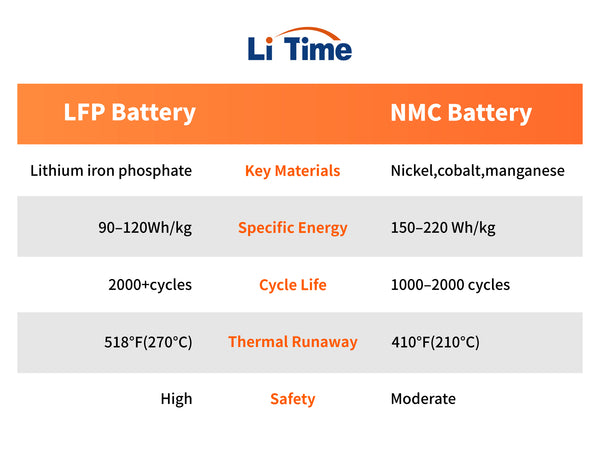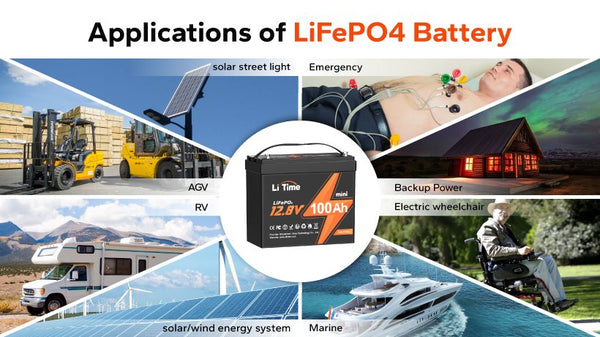When it comes to lithium-ion batteries, two popular options are LFP (lithium iron phosphate) and NMC (nickel-manganese-cobalt) batteries. Although both offer high energy density and long lifespan, there are significant differences between the two.
In this guide, we'll compare LFP vs NMC batteries based on performance, cost, safety, and lifespan, so you can make an informed decision about which one is best suited for your needs.
Part 1: Advantages of LiFePO4 Battery
Compared to NMC batteries, LFP (lithium iron phosphate) batteries have several advantages:
Longer lifespan: LFP batteries can last up to 10 years or more, depending on usage and maintenance. In contrast, NMC batteries typically have a lifespan of 5-7 years.
Higher safety standards: LFP batteries are inherently safer than NMC batteries due to their stable chemistry and lower risk of thermal runaway. They are also less prone to catching fire or exploding.
Better performance in low temperatures: LFP batteries can perform well in extreme temperature conditions, including sub-zero temperatures. This makes them ideal for applications like outdoor solar lighting or electric vehicles that need consistent performance in all weather conditions.
Part 2: Advantages of NMC Battery
Compared to LFP (lithium iron phosphate) batteries, NMC (nickel-manganese-cobalt) batteries have several advantages:
Higher energy density: NMC batteries can store more energy per unit of volume or weight, which means they can provide more power for longer periods without needing to be recharged.
Lower cost: NMC batteries are generally less expensive to manufacture compared to LFP batteries, making them a more cost-effective option for many applications.
More commonly used in commercial applications: NMC batteries are widely used in electric vehicles and other commercial applications due to their high energy density and lower cost.
Overall, NMC batteries are an attractive option for applications where high energy density and cost-effectiveness are crucial factors. However, they may not be as durable or safe as LFP batteries, especially in extreme temperature conditions.

Source: Battery University
Part 3: The Comparison of NMC and LFP Battery
LFP batteries use lithium iron phosphate as a cathode material and have a nominal voltage of 3.2 volts per cell. They are known for their exceptional safety standards, longer lifespan, and better performance in low temperatures.
In contrast, NMC batteries use nickel, manganese, and cobalt as cathode materials and have a nominal voltage of 3.6 volts per cell. They boast higher energy density, lower cost, and are more commonly used in commercial applications.
Here's a comparison between LFP (lithium iron phosphate) and NMC (nickel-manganese-cobalt) batteries based on several factors:
☆Performance☆
- Energy density: NMC batteries have higher energy density than LFP batteries, which means they can store more energy per unit of volume or weight.
- Charging time: LFP batteries can be charged faster than NMC batteries.
- Temperature range: LFP batteries perform better in low temperatures, while NMC batteries are more suitable for high-temperature environments.
☆Cost☆
- Manufacturing cost: NMC batteries are generally less expensive to manufacture compared to LFP batteries.
- Replacement cost: LFP batteries typically have a longer lifespan than NMC batteries, which means they may need to be replaced less frequently.
☆Safety☆
- Thermal stability: LFP batteries have a more stable chemistry compared to NMC batteries, which makes them less prone to thermal runaway and other safety issues.
- Fire risk: NMC batteries have a higher fire risk compared to LFP batteries due to their higher energy density.
☆Lifespan☆
LFP batteries can last up to 10 years or more, depending on usage and maintenance, while NMC batteries lifespan typically is 5-7 years.
☆Applications☆
NMC batteries:
- Electric vehicles (EVs): NMC batteries are widely used in EVs due to their high energy density, which allows the vehicle to travel longer distances on a single charge.
- Portable electronics: NMC batteries are commonly used in smartphones, laptops, and other portable electronics due to their high energy density and relatively low cost.
- Power tools: NMC batteries are also used in power tools, such as drills and saws, due to their high energy density and ability to provide consistent power over a long period.
- Grid-scale energy storage: NMC batteries are increasingly being used for grid-scale energy storage systems, such as large-scale solar or wind power, due to their high energy density and lower cost compared to other battery technologies.
LFP batteries:
- Renewable energy storage: LFP batteries are increasingly being used for renewable energy storage systems, such as solar or wind power, due to their long lifespan, reliability, and performance in harsh conditions.
- Electric bikes: LFP batteries are a popular choice for electric bike manufacturers due to their durability, safety, and ability to perform well in low temperatures.
- Backup power systems: LFP batteries are often used as backup power systems for critical infrastructure, such as hospitals, data centers, and telecommunications towers, due to their high reliability and long lifespan.
- Marine and RV applications: LFP batteries are also commonly used in marine and RV applications, where space constraints and durability are important considerations.

If you are choosing a LiFePO4 battery, LiTime is your best choice while providing grade-A cell LiFePO4 batteries with a 5-year warranty. Except for LiFePO4 battery, we also provides LiFePO4 battery charger, probable power stations and protable solar panels. As an one-stop solar enegy system solution provider, LiTime will always be enthusiastic to solve your problems. Contact service@litime.com to answer your questions.
Which Battery is Right for you?
To determine which battery is right for you, it's essential to consider your specific needs and goals. Here are some questions to ask yourself:
- What is the application? What device or system will the battery be used for?
- What are the power requirements? How much energy does the device or system need to operate?
- What is the expected lifespan of the battery? How frequently will it need to be replaced?
- What is the operating temperature range? Will the battery be exposed to extreme temperatures?
- What is the budget? How much can you afford to spend on the battery?
In general, if you prioritize safety, reliability, and performance in harsh conditions, LFP batteries may be the right choice for you. On the other hand, if you prioritize high energy density and cost-effectiveness, NMC batteries may be the better option.
However, the choice ultimately depends on your specific needs and goals. Consider factors such as power requirements, temperature range, lifespan, and budget when choosing between LFP vs NMC batteries. By doing so, you can ensure that you choose the right battery for your application and avoid poor performance, safety issues, and higher costs in the long run.
-------------------------------------------------------------------------------------
Learn more about
<<< Prismatic Vs Pouch LiFePO4 Batteries: Which Is The Best For Your RVs, Boats, Or Solar Homes?
<<< [Newest] A Complete Comparison Between LiFePO4 Battery And Lead Acid Battery








